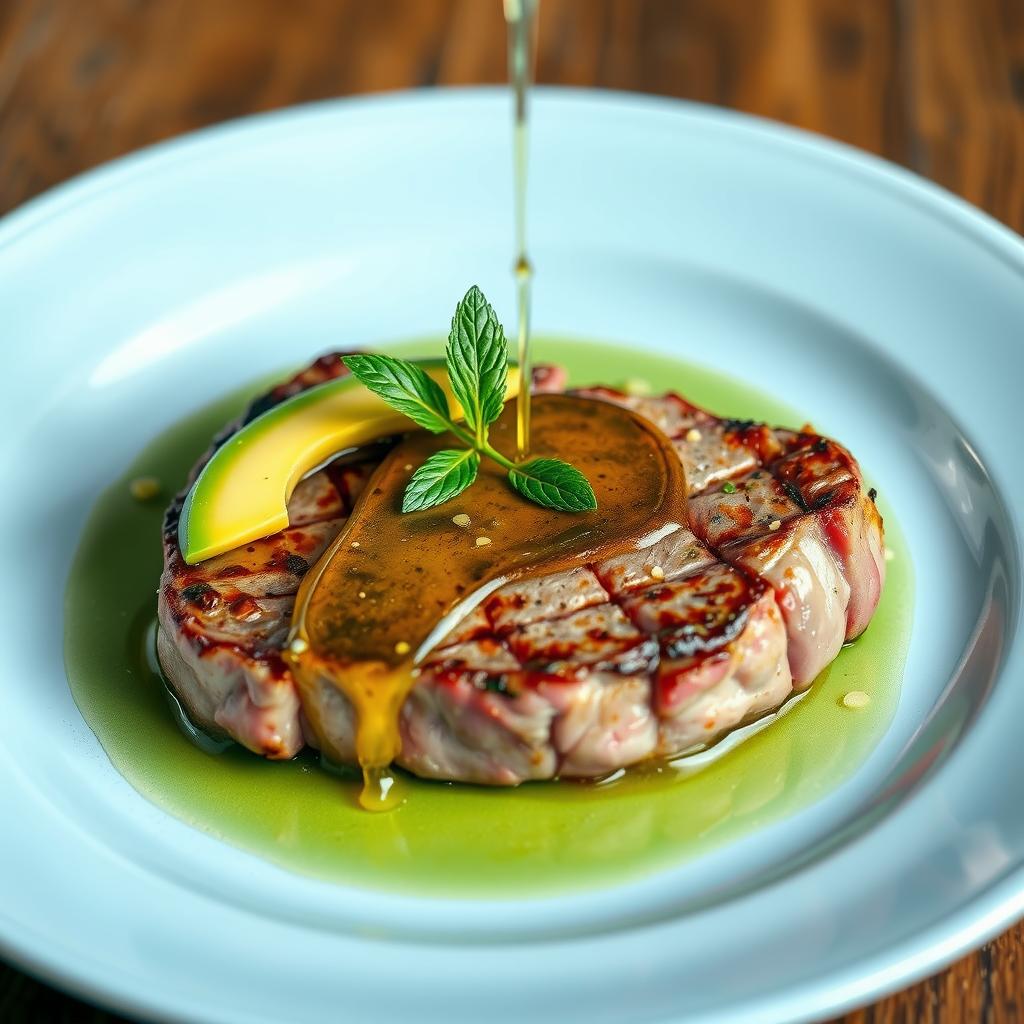Alright, let's tackle this.
Can you cook steak with avocado oil?
That's the question on your mind, right?
Let's get straight to the point.
Can You Cook Steak with Avocado Oil? The Straight Dope
I get it, you're standing in front of your stove, beautiful cut of beef in hand, wondering if avocado oil is the right choice for searing that perfect steak.
It's a valid concern.
You want that crust, that juicy interior, the whole nine yards.
You don't want to screw it up.
So, can you cook steak with avocado oil?
The short answer is yes, absolutely, you can cook steak with avocado oil.
But let's dig into why, and how to do it right.
Why Avocado Oil is a Solid Choice for Steak
Listen, there are a ton of cooking oils out there.
Olive oil, vegetable oil, canola oil, the list goes on.
So, why even consider avocado oil for your steak?
Here's the deal:
-
High Smoke Point: This is huge. Avocado oil boasts a smoke point around 520°F (271°C). This means you can crank up the heat without the oil breaking down and turning acrid. You need high heat to get that perfect sear on your steak. Other oils, like extra virgin olive oil, have lower smoke points and aren't ideal for high-heat cooking.
-
Neutral Flavor Profile: Avocado oil doesn't impart a strong flavor to your steak. You want to taste the beef, not the oil, right? Unlike olive oil, which has a distinct flavor, avocado oil lets the steak's natural flavor shine.
-
Healthy Fats: Okay, let's be real, you're probably not cooking steak for health reasons primarily. But, avocado oil is rich in monounsaturated fats, which are considered healthy fats. It's a bonus, not the main event.
So, a high smoke point, neutral flavor, and a little dose of healthy fats make avocado oil a great contender for cooking steak.
Avocado Oil vs. Other Oils for Steak: A Quick Rundown
Let's compare avocado oil to some other common cooking oils:
-
Avocado Oil vs. Olive Oil: As mentioned, avocado oil wins for high-heat cooking due to its higher smoke point. Olive oil is better suited for lower-temperature cooking or as a finishing oil.
-
Avocado Oil vs. Vegetable Oil: Vegetable oil often has a high smoke point, but the flavor is sometimes less desirable, and the quality can vary greatly. Avocado oil is generally a higher-quality product.
-
Avocado Oil vs. Canola Oil: Similar to vegetable oil, canola oil has a high smoke point but lacks the flavor and potential health benefits of avocado oil.
-
Avocado Oil vs. Ghee/Clarified Butter: Ghee also has a high smoke point and adds a delicious, nutty flavor to steak. It's a great option, but if you want a neutral flavor, avocado oil is the way to go.
Choosing the right cooking oil really boils down to what you're trying to achieve with your steak. Do you want a specific flavor, or just a perfectly seared crust?
Getting the Most Out of Cooking Steak with Avocado Oil
Alright, you're convinced, avocado oil is the way to go.
Now, let's make sure you nail it.
Here are some tips for cooking steak with avocado oil like a pro:
-
Choose the Right Cut of Steak: This is fundamental. A well-marbled steak, like a ribeye or New York strip, will give you the best results.
-
Dry Brine Your Steak: Salt your steak generously at least 40 minutes (or even the night before) before cooking. This helps the steak retain moisture and enhances the flavor.
-
Pat the Steak Dry: This is crucial for getting a good sear. Moisture is the enemy of a crispy crust. Use paper towels to thoroughly dry the surface of the steak.
-
Heat the Oil Properly: Get your pan screaming hot before adding the steak. The oil should be shimmering but not smoking.
-
Don't Overcrowd the Pan: If you're cooking multiple steaks, do it in batches. Overcrowding lowers the pan temperature and prevents a good sear.
-
Use a Meat Thermometer: Don't guess! A meat thermometer is your best friend for achieving the perfect level of doneness.
-
Let the Steak Rest: After cooking, let the steak rest for at least 10 minutes before slicing. This allows the juices to redistribute, resulting in a more tender and flavorful steak.
By following these tips, you'll be well on your way to cooking a restaurant-quality steak at home, using avocado oil to its full potential.
The Final Sear: Mastering Steak with Avocado Oil
So, there you have it.
Can you cook steak with avocado oil? Absolutely.
It's a fantastic option for achieving that perfect sear and delicious flavor.
Just remember to choose the right cut, prepare your steak properly, and pay attention to the details.
Alright, let's keep this steak conversation going.
We've established that, yes, you can cook steak with avocado oil, and it's a damn good choice.
Now, let's dive even deeper to ensure your next steak is the best one yet.
Elevating Your Steak Game: Advanced Techniques with Avocado Oil
You're not just looking to cook a steak, you're aiming for perfection.
I get it.
Let's talk about some advanced techniques that will take your steak, cooked with avocado oil, to the next level.
-
Reverse Searing: This involves cooking the steak at a low temperature in the oven until it's almost to your desired doneness, then searing it in a screaming hot pan with avocado oil for a perfect crust. This ensures even cooking and a phenomenal sear.
-
Basting with Aromatics: While searing your steak in avocado oil, add aromatics like garlic cloves, sprigs of thyme, and rosemary to the pan. As the oil heats up, these aromatics will infuse the steak with incredible flavor.
-
Pan Sauce Perfection: After you've seared your steak and removed it from the pan, don't discard those flavorful drippings! Use them to create a pan sauce by deglazing the pan with red wine or beef broth, then adding butter and herbs. This sauce will complement your steak beautifully. Avocado oil's neutral profile makes it a great base for letting these flavors shine.
-
Compound Butter Boost: Create a compound butter by mixing softened butter with herbs, garlic, and spices. Top your steak with a pat of this compound butter as it rests. The melting butter will add richness and flavor.
These techniques, combined with the high smoke point and neutral flavor of avocado oil, will give you steakhouse-quality results in your own kitchen.
Understanding the Maillard Reaction: The Science Behind the Sear
Ever wonder why a perfectly seared steak tastes so good?
It's all thanks to the Maillard reaction.
This is a chemical reaction between amino acids and reducing sugars that occurs when food is heated to high temperatures.
It's responsible for the browning and complex flavors that develop on the surface of your steak.
Avocado oil, with its high smoke point, allows you to reach the temperatures necessary for the Maillard reaction to occur without the oil breaking down and imparting off-flavors.
This is why using avocado oil when cooking steak is so effective for achieving that desirable crust.
Choosing the Right Avocado Oil: Not All Oils Are Created Equal
Just like with any ingredient, the quality of your avocado oil matters.
Look for:
-
100% Pure Avocado Oil: Avoid blends or oils that contain other additives.
-
Cold-Pressed: This method preserves the natural flavor and nutrients of the avocado.
-
Refined Avocado Oil: Good for high heat cooking because of it's high smoke point.
-
Dark Glass Bottle: This helps protect the oil from light and oxidation.
Investing in a good quality avocado oil will make a noticeable difference in the flavor and performance of your steak.
Troubleshooting Common Steak Cooking Problems with Avocado Oil
Even with the best ingredients and techniques, things can sometimes go wrong.
Here are some common steak cooking problems and how to fix them when using avocado oil:
-
Steak Isn't Searing Properly: Make sure your pan is hot enough before adding the steak. Pat the steak dry to remove excess moisture. Don't overcrowd the pan.
-
Steak Is Overcooked on the Outside, Undercooked on the Inside: Reduce the heat and cook the steak for a longer period of time, or use the reverse searing method.
-
Steak Is Tough: Choose a more tender cut of steak, dry brine it properly, and don't overcook it. Make sure to let it rest before slicing.
-
Steak Lacks Flavor: Season generously with salt and pepper. Use aromatics in the pan while searing, and consider topping with a compound butter.
By understanding these common problems and how to solve them, you'll be able to consistently cook delicious steaks with avocado oil.
Exploring Steak and Avocado Oil Pairings: Sides and Sauces
The perfect steak deserves equally delicious sides and sauces.
Here are some pairings that complement steak cooked with avocado oil:
-
Classic Sides: Creamy mashed potatoes, roasted asparagus, sautéed mushrooms, and a simple green salad.
-
Bold Sauces: Chimichurri, béarnaise, red wine reduction, and a horseradish cream sauce.
-
Unique Pairings: Grilled avocado slices, a corn and black bean salsa, or a sweet potato puree.
The neutral flavor of avocado oil allows you to experiment with a wide range of flavors and textures, creating a truly memorable meal.
Is Cooking Steak With Avocado Oil Healthy?
While you're probably not eating steak solely for health benefits, it's worth noting that avocado oil offers some nutritional advantages.
It's rich in monounsaturated fats, which are considered healthy fats.
It also contains antioxidants and vitamin E.
However, remember that steak itself is a rich food, so moderation is key.
Using avocado oil can be a slightly healthier option compared to some other cooking oils, but it's still important to enjoy steak as part of a balanced diet.
Frequently Asked Questions (FAQ)
-
Can I use avocado oil on the grill for steak? Absolutely! Avocado oil's high smoke point makes it perfect for grilling.
-
How much avocado oil should I use to cook steak? Just enough to lightly coat the bottom of the pan. Too much oil can prevent proper searing.
-
Can I reuse avocado oil after cooking steak? It's generally not recommended to reuse oil after cooking steak, as it can pick up flavors and impurities.
-
Does avocado oil add any flavor to steak? Avocado oil has a very neutral flavor, so it won't significantly alter the taste of your steak.
-
Can I use avocado oil for marinades? Yes, avocado oil can be used in marinades, but its neutral flavor won't contribute a strong taste.
The Grand Finale: Mastering the Art of Steak with Avocado Oil
And there we have it, from the basics to the advanced techniques, you're now armed with everything you need to cook incredible steak with avocado oil.
Remember to choose a high-quality oil, master the searing process, and don't be afraid to experiment with flavors.
With a little practice, you'll be cooking steak that rivals the best steakhouses in no time, all thanks to the power of cooking steak with avocado oil.





